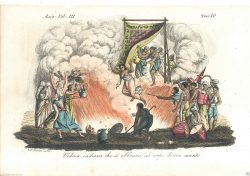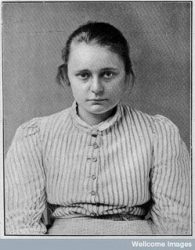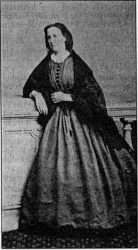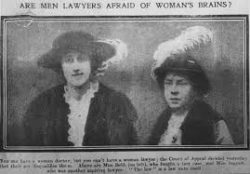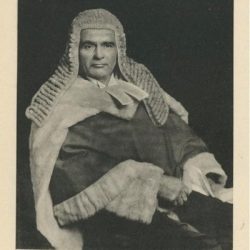This blog is part of a wider project showcasing a selection of the assessed work done by students of Gender and the Law at Birmingham Law School in 2017-2018. The purpose of the project is to prompt students, staff and visitors at the Law School to explore women’s local legal history. The project is inspired … Continue reading “Introduction”
The Birmingham Ladies Association for the Care of Friendless Girls
By Annabelle Katumba “It is men only men, from the first to the last, that we have to do with! To please a man I did wrong at first, then I was flung about from man to man…By men we are examined, handled, doctored and messed with. In hospital it is a man again who … Continue reading “The Birmingham Ladies Association for the Care of Friendless Girls”
James Peggs and The Coventry Society for the Abolition of Human Sacrifices in India
By Laban Gabiddon ‘Nineteenth-century British India was marked by a series of debates on reforming the status of women. The first and most sensational public debate was concerned with outlawing sati.’[1] James Peggs was one of the first Baptist missionaries to arrive in Bengal along with his wife in 1822.[2] Peggs was appalled by the … Continue reading “James Peggs and The Coventry Society for the Abolition of Human Sacrifices in India”
Shifting the Boundaries of the Public and the Private : Ellen Pinsent, Women and the Mental Deficiencies Act 1913
By Eleanor O’Donnell The position of women in society at the beginning of the 20th Century was one of subordination. The separation of the private and public sphere perpetuated this by emphasizing the ideal woman remains at home, whilst the ideal man went out to work in public. ‘During [this] period…[the] separation of the public and … Continue reading “Shifting the Boundaries of the Public and the Private : Ellen Pinsent, Women and the Mental Deficiencies Act 1913”
Bessie Rayner Parkes and The Married Women’s Property Act
We have two posts on Bessie Rayner Parkes – one focusing on her activism by Amandy Jimenez, and one focusing on the broader legal context of that activism by Aminah Khanom.
Birmingham Women and the Factory Acts
By Tawnni Castano de la Cuesta Introduction: Factory Acts & Women in Birmingham Birmingham, ‘The City of a Thousand Trades’, was one of the world’s first and largest industrial cities in the 19th century. Birmingham was a leading metal manufacturer, but it also manufactured jewellery, buttons, pens, guns, and toys. Despite being a large industrial … Continue reading “Birmingham Women and the Factory Acts”
The Victorian Social Purity Movement; a Noble Pursuit or ‘Morality Crusade’?
Author: Ella Phillips An Insight into the Social Purity Movement in Birmingham By 1885 the Ladies Association for the Care of Friendless Girls (LA), an initiative founded by religio-feminist campaigner Ellice Hopkins, had 106 branches across England. One of its aims, using both preventative and reformative approaches, was to educate young women in a bid … Continue reading “The Victorian Social Purity Movement; a Noble Pursuit or ‘Morality Crusade’?”
‘The very antithesis of womanhood’: Edith Roberts and the Infanticide Acts
By Jasmine Lalli Introduction: In 1921, Edith Roberts was a 21-year-old, unmarried, factory worker living in Hinckley, Leicestershire. Unbeknownst to her family – with whom she lived – she gave birth secretly in the attic room she shared with her sister. Her stepmother discovered the body of the baby three days later, stuffed in a … Continue reading “‘The very antithesis of womanhood’: Edith Roberts and the Infanticide Acts”
Gwyneth Bebb and Diversity in the Legal Profession
Author: Elena Chrysostomou Until 1919 women were prevented from entering certain professions, such as practising as solicitors. Bebb v The Law Society[1] was influential in the campaign for female solicitors. This case eventually resulted in the passing of the Sex Disqualification (Removal) Act 1919 (1919 Act). The inclusion of women in the legal profession is … Continue reading “Gwyneth Bebb and Diversity in the Legal Profession”
Catherine Hayes: ‘The sexual predator burnt at the stake for her life of sin’
By Louise McCarthy Born in the West Midlands in 1726, Catherine Hayes was a party to the murder of her husband, alongside Thomas Billing and Thomas Wood. Both men, who were the main actors in the killing, were convicted of murder and sentenced to death by hanging. Catherine however, was convicted of petty treason, a … Continue reading “Catherine Hayes: ‘The sexual predator burnt at the stake for her life of sin’”
A Revolutionary Without the Means: Justice Henry McCardie and the Position of Wives under British Law
By Rebecca Bradley It is not surprising that the position of married women within the law in the early 1900’s, was unequal to that of men. Although, at the conclusion of the First World War, the law seemed to be improving women’s lives by ‘allowing’ them the right to vote and the right to hold … Continue reading “A Revolutionary Without the Means: Justice Henry McCardie and the Position of Wives under British Law”



